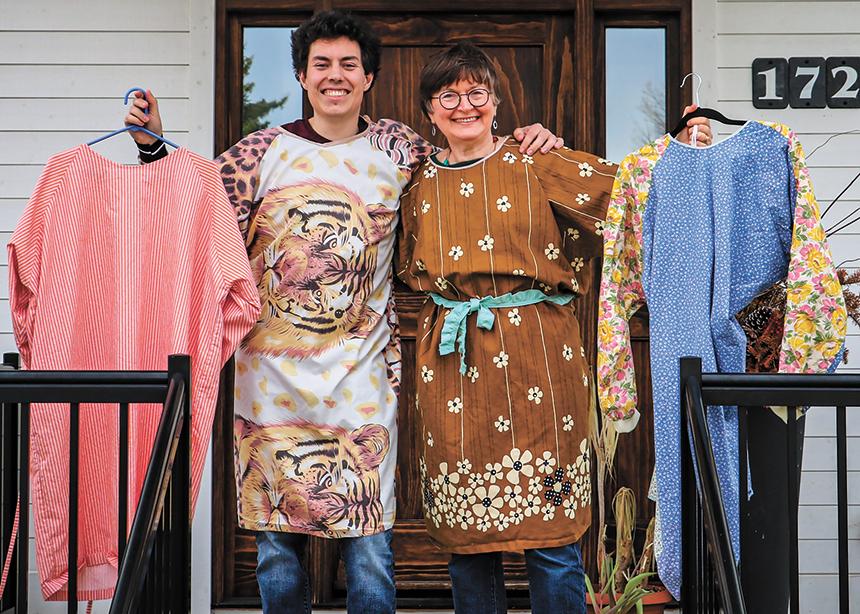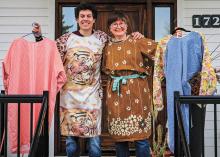When Bev Suderman-Gladwell was asked by a physician friend to “leverage her Mennonite connections,” to respond to a time-sensitive need, she had no way of knowing an “extraordinary project” would grow out of that request.
Just over a month later, “sewists” (sewing+artists) from across Waterloo Region, Ont., have sewn more than 1,200 homemade gowns, 1,500 scrub caps and 600 face masks for local frontline health-care providers. They are working on another batch of 200 gowns destined for frontline workers at the House of Friendship’s men’s shelter, currently operating out of a local hotel to make physical distancing possible. There is no clear end in sight. The requests just keep coming.
Suderman-Gladwell says it has been an “amazing inter-church, inter-faith, community effort.” But she notes that theirs is only “one group doing one corner of this,” citing many other local, provincial and national efforts to sew supplies for health-care workers.
It all started when Suderman-Gladwell’s physician friend, Sophie Wilson, identified the need for homemade, personal protective equipment for frontline health-care providers, as a stop-gap, emergency measure while industry ramped up production of these types of products.
Suderman-Gladwell, who attends Waterloo North Mennonite Church in Waterloo, Ont., tapped into her network of connections and emailed Mennonite churches to solicit volunteer sewists. It grew from there, spreading to social media. People from all over the region were eager to help.
So many people picked up the ready-to-sew kits on the first day that supplies ran out. The second day, people—following physical-distancing protocols—lined up around a local church in the pouring rain to pick up the next batch of kits.
Volunteers began sewing gowns meant for frontline health-care providers in doctor’s offices, homeless shelters, food banks, medical clinics and midwifery practices, but they soon branched out to also make scrub caps and facemasks. The gowns have adjustable ties, and are washable and reusable. Patterns are provided. Fabric can be pre-cut to make it easier for the sewists.
Requests for the gowns, caps and masks come in from a local physician’s group that Wilson is part of, which also takes care of distributing the finished products.
As one of six organizers, Suderman-Gladwell has seen first-hand the “power of groups.” More than 470 people have connected to the sewing project through a Facebook page, called KW COVID-19 Sewn Medical Supplies. People mobilized groups of sewists in their churches—conservative Mennonite, Unitarian, Church of Latter Day Saints and others—requesting more fabric and patterns than what the organizers could provide at the beginning.
A local quilt shop owner used her contacts to source appropriate fabric. Other retailers donated fabric and notions, like elastic and fasteners, or offered them at discount prices. People donated money. Some offered to pick up and drop off supplies and finished products.
One sewist knew of an athletic wear firm that was going out of business in a nearby town. A cold call to the owner led to a generous donation. He gave them his remaining stock of fabric—enough for 400 gowns.
Suderman-Gladwell sees incidents like this as “providential.” She says, “I choose to see the leading of God.”
Although she admits she doesn’t even like sewing, Suderman-Gladwell sees her role in helping to organize this effort as a way of “putting my faith into action.”
She calls the organizing committee and the sewists amazing people. The whole thing has given her “a sense of purpose,” helping out a sector close to her heart. She recently retired after serving for more than 16 years as a chaplain at Parkwood Seniors Community in Waterloo and knows first-hand the needs of frontline caregivers.
But she acknowledges a mix of feelings as she reflects on what it has been like to be part of such an effort. “Look what we have done . . . from the ground up,” she says, celebrating the effort of so many volunteers.
While she is humbled and deeply grateful for the community effort, she also names “incredible frustration” that six weeks into the pandemic frontline workers are still relying on homemade personal protective equipment. Her heart breaks every time she hears of requests for more gowns, especially in the hard-hit long-term-care sector.
To connect to the group, visit bit.ly/kwcovid-med-supplies.
Do you have a story idea about Mennonites in Eastern Canada? Send it to Janet Bauman at ec@canadianmennonite.org.






Add new comment
Canadian Mennonite invites comments and encourages constructive discussion about our content. Actual full names (first and last) are required. Comments are moderated and may be edited. They will not appear online until approved and will be posted during business hours. Some comments may be reproduced in print.